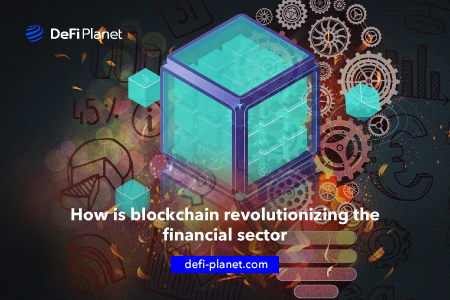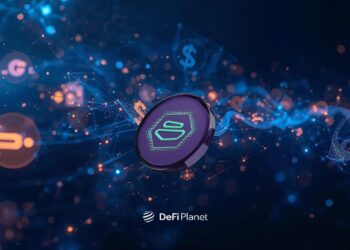Last updated on November 17th, 2022 at 01:44 pm
DeFi is a rapidly growing blockchain sector with enormous potential. Decentralization technologies have the potential to totally transform the financial system, making it safer, more open, and less expensive for end-users.
Every year, more and more people learn about how much better decentralized platforms are than centralized ones. This is primarily about trading platforms. DeFi platforms such as Aave, SushiSwap, 1inch, and others already allow consumers to exchange pegged assets. Many crypto investors who recognize DeFi’s significance are investing substantially in the sector.
This article explores the different ways in which DeFi is disrupting the finance industry.
How Does DeFi Work?
Quick and inexpensive access to capital, as well as efficient lending and borrowing, are some of the benefits provided by DeFi initiatives using the blockchain network. Due to their decentralized nature, some DeFi systems, such as Uniswap, have evolved into highly efficient global financial marketplaces catering to individuals and institutions. DeFi also eliminates intermediaries, making financial services more efficient and affordable.
Since DeFi works on a blockchain network and is often open-source, anyone with an internet connection can verify, audit, and view all transactions. Furthermore, blockchain data is immutable, which means it cannot be altered after being uploaded to the blockchain network. As a result, the decentralized financial system is trustless and code-based.
The Rise of Decentralized Exchanges (DEXs)
In recent years, decentralized finance has successfully transformed the financial industry. As a result, DeFi and decentralized exchanges on the blockchain network have grown in popularity, with disintermediation as the primary concept.
Users can earn considerable passive income by providing liquidity to the DeFi platforms’ liquidity pools. Unlike traditional banks and centralized financial services, DeFi businesses don’t require intermediaries or custodians to provide services such as buying, selling, lending, and borrowing crypto assets.
DEX users can directly use blockchain technology to conduct transactions or purchase services. Due to the DEX’s non-custodial nature, users can store their cryptocurrencies and have complete control over the assets in their wallets. On the other hand, DeFi and DEXs rely on smart contracts: automated computer codes that run on a blockchain network.
The Ethereum blockchain network is used for most DeFi initiatives because it was the first to provide an architecture allowing developers to create decentralized apps. Polkadot, Cardano, and Solana are among the new blockchain networks striving to develop better, more scalable blockchains for DeFi initiatives.
Benefits of DeFi
Decentralized Finance applies the fundamental ideas behind blockchain technology to improve financial security and transparency, unlock liquidity and growth potential, and pave the way for an economy that is more integrated and uniform.
No third-party intervention
Smart contracts, rather than humans, handle the operations of DApps (decentralized apps). Once the smart contract is added to the blockchain, DApps run automatically with little or no help from people.
Furthermore, because most DApps are non-custodial — meaning that no platform has the private keys to users’ cash — no intermediary has control over or access to their assets.
Community-driven
Communities play a critical part in the growth of DeFi. Since most decentralized apps and protocols are open-source, community developers can add new features and create new apps. A project can be forked to release a revised version of the original project.
Transparency
Anyone can audit the code on the blockchain. Users will have more faith in the smart contract because everyone on the network may understand its functionality and discover faults. Also, anyone can view the transaction activity because it is public. Even though this could be a problem for privacy, the transactions are pseudonymous by default, which means they are not linked to users’ real identities.
Global availability
DApps are available from any location on the planet. Users can access the same DeFi services and networks regardless of whether they are in a European or African country. Users can access DApps with just an internet connection, even though local laws apply.
Permissionless
Unlike traditional finance, there are no gatekeepers or paper-based accounts in DeFi. Anyone can build a DApp and utilize it. Users can communicate directly with smart contracts.
How is DeFi Different from Traditional Finance?

The debate over the difference between DeFi and traditional finance is popular. The following are the most notable distinctions between the two:
- A public blockchain is the source of trust in decentralized finance, controlling all financial transactions. On the other hand, traditional finance manages all operations through public governance, including regulations and licensed financial organizations.
- Decentralized finance is gaining traction because it is more open and transparent than traditional finance. Due to the lack of entry barriers, anyone with programming skills can contribute to developing financial services and tools on top of public blockchains.
- Due to significant entry barriers, the traditional financial system is unlikely to welcome the emerging trend. The requirement to obtain appropriate licenses and authorization from regulators has stifled innovation in traditional financial systems.
How DeFi is Transforming the Financial Sector?
DeFi is a revolutionary technology that will profoundly transform the existing financial system. This niche opens up many new opportunities for blockchain firms and regular people alike. We’ll look at a few examples to better understand what DeFi implies in today’s financial world.
Exchange platforms
Decentralized exchange platforms are one of the most well-known types of DeFi products. Peer-to-peer protocols underpin the concept of a decentralized exchange. Assume you want to buy Ethereum and sell it for XRP. When using platforms like Coinbase or Binance, you’re using a third-party platform. Decentralized finance platforms are distinguished by the use of smart protocols for transactions. Uniswap pools all tokens and transfers funds to users when all contract terms are met.
Synthetic assets based on crypto
Synthetic crypto assets are a DeFi market worth $8 billion that allows traders to trade synthetic digital currencies on multiple P2P platforms. Users can access numerous assets using cryptocurrency-based synthetic assets without owning the underlying asset.
Consider the case of Abra, a decentralized investing platform. If a user buys $10,000 worth of Apple stock in BTC, the platform will add or deduct BTC from the investor’s account depending on the performance of Apple’s stock.
Lending and investing platforms
DeFi protocols such as Alchemix, MakerDAO, Aave, and others enable financial institutions to take out loans, deposit digital coins, and trade them. Users can deposit around 30 different cryptocurrencies, including stablecoins, on Aave. This platform is like a traditional bank because it offers different annual percentage yields (APYs) for different tokens.
When both parties do not know each other’s personal information, it can be confusing how decentralized platforms handle lending money. Banks look at their credit history and current financial situation to ensure that borrowers’ loans will be paid off. Conversely, DeFi platforms require borrowers to set aside funds that will be transferred to lenders if loans are not repaid.
Open money marketplace
Decentralized investors and borrowers will love open money marketplaces. An excellent example of such a marketplace is Compound.finance. Lenders put their money into a pool of liquidity that borrowers can access. The liquidity pool is a smart contract collection that matches each borrower with the appropriate assets.
The platforms aren’t banks, and they don’t act as middlemen. When a contract goes into effect, it is automatically given to both the lender and the borrower. Once all liabilities have been fulfilled, the contract is no longer valid.
Automated investment
For cryptocurrency investors, the DeFi market offers automated platforms. For example, Bloq, a blockchain infrastructure firm, launched Vesper, a tool that automates DeFi transactions. The tool’s overall concept is similar to mutual funds, but it is implemented on the blockchain.
Challenges Hindering DeFi’s Impact on the Financial Sector
Even good technology has problems that can make it difficult for people to use. Decentralized finance is no different.
People being forced to trust unregulated open-source code is one of the most significant challenges preventing decentralized finance from replacing traditional finance systems. Since anyone with access to the source code for a decentralized finance system can hack smart contracts and steal all the keys, people could lose a lot of money.
The underlying technology for decentralized finance applications is still not very user-friendly and will always be prone to security breaches that hurt the technology’s reputation.
In Conclusion,
- The sector’s rapid growth demonstrates the importance and relevance of the DeFi ecosystem in today’s market. The DeFi sector will continue to grow as cryptocurrency adoption becomes more widespread.
- Decentralized banking and cryptocurrency will impact how financial services are offered in the next decade, if not the next few years.
- While DeFi may appear complicated, it has the potential to reduce the cost and security of financial transactions while also expanding access to everyone.
- If decentralized finance is going to replace the current financial system, it must deal with issues like security, scalability, regulations, and liquidity.
If you would like to read more articles like this, visit DeFi Planet and follow us on Twitter, LinkedIn, Facebook, and Instagram.
“Take control of your crypto portfolio with MARKETS PRO, DeFi Planet’s suite of analytics tools.”





















